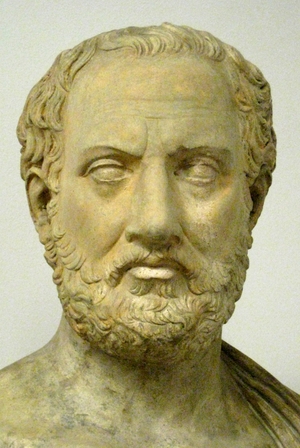Thoukudídēs (Thucydides)

Thucydides is not just the founder of the science of history, history without miracles and omens, history based on facts. He is also the founder of a materialistic, that is, economic understanding of it.
Thucydides begins his history with how trade develops under the protection of the state. If there is no such protection, then no one will waste energy in producing things that will be taken away by robbers. Thucydides was followed by many, but the other side of his reasoning has been much less popular with historians: the army not only creates the conditions for production and trade, but also depends on them. Thucydides discusses in detail the organisation of the army's supply, speaks of the key role of money in war, and talks about how the level of development of the division of labour determines the state's ability to wage war. The size of the army depends not so much on the size of the population as on material resources - this idea, which would later be developed by economists, is already present in the work of the first historian.
The way Thucydides writes about the nature of law is cynical, in the spirit of sophists: if there is the strong and the weak, then there is no other right than the power of the strong, and the weak can only submit. Dreams of divine or, what is the same, ‘natural’ right, i.e. right that is not backed up by someone's power but somehow miraculously realises itself, are nothing more than empty dreams. Again, many historians have adopted such ‘cynicism.’ But Thucydides does not limit himself to this position.
...it is a thing impossible and of great simplicity to believe when human nature is earnestly bent to do a thing that by force of law or any other danger it can be diverted.
Here the author is not just referring to some abstract ‘nature’, but is explicitly stating exactly what ‘nature’ he is referring to.
...either some greater terror than death must be devised, or death will not be enough for coercion. For poverty will always add boldness to necessity; and wealth, covetousness to pride and contempt.
Thucydides sees the development of trade and the division of labour as the engine of history - and at the same time as the source of social contradictions. The contradictions between the rich and the poor, the lenders and the debtors, the free and the slaves, which find their expression in the political confrontation between parties and states. The historian does not describe why and how this division of society into opposing parties or, if you like, classes, occurs, but the fact itself is stated accurately, as well as its consequences. The detailed answer to these questions is the subject of political economy.